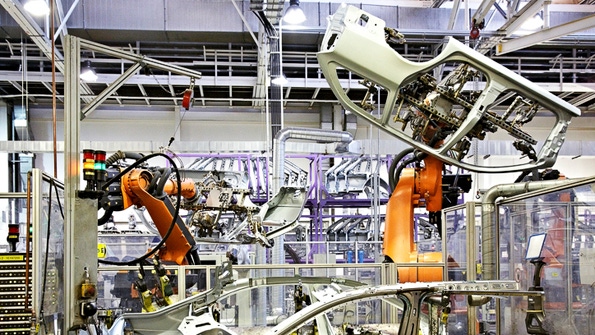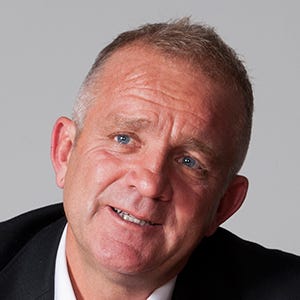Ever notice how the information and telecommunications technology (ICT) distribution sector resembles the car industry? Think about it. Both are massive, multibillion dollar businesses that depend on complex, global supply chains. Both have once-dominant powers that have been shaken. And both depend on powerful networks of dealers, resellers, suppliers and other members of a global ecosystem.
July 7, 2017

Ever notice how the information and telecommunications technology (ICT) distribution sector resembles the car industry?
Think about it. Both are massive, multibillion dollar businesses that depend on complex, global supply chains. Both have once-dominant powers that have been shaken. And both depend on powerful networks of dealers, resellers, suppliers and other members of a global ecosystem.
There are other similarities, too. Both industries, for example, are undergoing a once-in-a generation transition. In autos, the rise of ridesharing and electric cars is upending everything. (Though it only sells one car for every 125 that GM does, Tesla has roughly the same market cap as the Detroit industrial giant.)
In technology distribution, a similar rise in software services is having an equally transformative impact. In addition to fueling dealmaking, it’s opened the door to new entrants and upstarts. This includes Avant, Pax8 and Exclusive Group. Avant, for one, considers itself to be nothing less than “the leader in channel sales enablement of next-generation IT technologies.”
How are these companies doing it? Many are borrowing a page from Tesla, which recognized that the old way of making cars—aka with standard internal combustion engines that could be refueled in more than 100,000 retail locations nationwide—was ripe for disruption. Like Tesla, distribution’s upstarts have focused on newer technologies, alternative partners and distinct customer benefits to help differentiate themselves from larger, more entrenched rivals.
In November of last year, Pax8 CEO John Street told MSPmentor Editor Aldrin Brown “…the old line distributors weren’t in tune with how you push software-as-a-service (SaaS) product through the channel.” So he launched Pax8 to “fix distribution for the cloud market.”
Since then, the company has focused “exclusively on cloud services, aggregating leading cloud solutions for Managed Service Providers (MSPs) to service their small and medium-sized business (SMB) customers.”
Then there’s Exclusive Group, a London-based distributor of security and cloud technologies. On July 6, the $1 billion company announced its entry into the U.S. market with the acquisition of Fine Tec, a scrappy San Jose distributor of network security, data integrity and storage solutions. Over the past 20 years, Fine Tec has built itself into a $230 million powerhouse. Fine Tec CEO James Shen scoffs at the idea that macroeconomics, which tend to favor bigger players that operate at scale, should have toppled his company years ago. Instead, while bigger distributors expanded by partnering with thousands of companies, his company grew steadily by focusing on a slim few.
“Work hard. Partner selectively. And do something different than the competition,” is how Shen explained Fine Tec’s success formula.
Asked what’s threatening the traditional way of distributing products, Exclusive Group COO Barrie Desmond said distributors go to the “dark side” when they become broadline organizations. They focus on transactions not outcomes, on efficiencies not value.

Barrie Desmond, Exclusive Group
His company aims to take on its rivals with a “Disruptive Distribution Blueprint” that involves deeper relationships with a smaller number of vendor partners, better customer intimacy with VARs and systems integrators, and superior sales and engineering support services. Can he pull that off despite so much uncertainty within the tech industry? He believes so, especially when you consider that no one truly knows yet how cloud computing, AI and other technologies will impact the channel going forward. “As we say in Europe, the one-eyed man is king in the land of the blind,” he says.
Asked what he makes of all the recent deal-making in distribution, which includes the recent acquisition of Westcon-Comstor by Synnex and the acquisition of Avnet’s Technology Solutions business by Tech Data, Desmond says no one model for the future has emerged. So, companies are trying various strategies to buffer themselves from expected and unexpected changes.
Which brings us back to the auto industry. Today, car companies aren’t sure who their customers will be in a decade, what their transportation needs will be or even what types of vehicles they should build. Recognizing that its future customers could include more professional drivers than everyday consumers, GM has partnered with both Lyft and Uber to develop deeper affinity with these potential customers. To hedge its bets, meanwhile, VW has developed a driverless car named Sedric. Car companies have also eyed new sales channels, though they remain wary of alienating the affections of dealers.
Similarly, distribution companies find themselves thrashing about looking for answers amid uncertainty. Much like car companies, they have little window into who their customers will be in a decade’s time (it could be end users), what technologies they will want or even what business models they themselves will pursue.
Despite the uncertainty, no one is panicking, at least not yet. Rather than succumbing to the massive shift to the cloud, distributors are retooling and shifting their businesses, says Tim Curran, CEO of the Global Technology Distribution Council (GTDC), a Florida-based trade group that represents distribution interests.
“GTDC members are making unprecedented investments and experiencing sales growth for services capabilities around cloud, managed services and other next-generation solutions,” he wrote in a recent blog.
Fair enough, I say. But I do believe the market will divide into winners and losers sooner than later, regardless of who ultimately winds up in the driver’s seat.
About the Author(s)
You May Also Like


